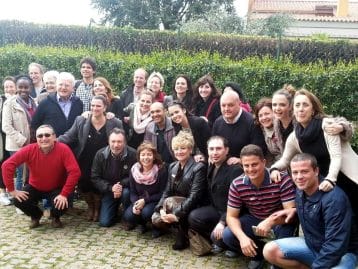
Mar 17, 2016 | Focolare Worldwide, Senza categoria
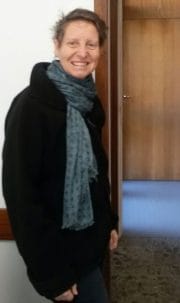 “I started to give a hand, Annette, a German Focolarina recounts, “in December 2014. The cold had already set in and there was urgent need for blankets. In trying to find out more, a member of the RomAmoR ONLUS proposed: “More than blankets we need you to come and give us a hand.” The week after I was already at the Ostia station. It was a really moving experience. On approaching those people I discovered that oddly enough, they were the ones to welcome me! I realised that this is not an uncomfortable category of people to avoid, but persons who wish to relate with others, and are capable of imbuing human warmth. After a while also the volunteers came with a hot dinner and the anonymous, cold and bleak station, warmed up. ” Annette has changed since then. The first nights she couldn’t sleep thinking of Giovanni, Stefan, Mohamed who did not have a warm bed like hers. She started to review her wardrobe, to see if there was still something else she could share, despite the fact that in the Focolare community already tries to live only with the essentials. But above all, she continued going to the station every Monday. One evening, looking at the notebook that listed the requests of the homeless, she saw that a man needed a pair of shoes. Since there were none in the house she remembered Chiara Lubich’s experience during the war, when she asked Jesus present in the poor, for a pair of shoes. “So I did the same thing and in two weeks ten pairs of shoes arrived!”
“I started to give a hand, Annette, a German Focolarina recounts, “in December 2014. The cold had already set in and there was urgent need for blankets. In trying to find out more, a member of the RomAmoR ONLUS proposed: “More than blankets we need you to come and give us a hand.” The week after I was already at the Ostia station. It was a really moving experience. On approaching those people I discovered that oddly enough, they were the ones to welcome me! I realised that this is not an uncomfortable category of people to avoid, but persons who wish to relate with others, and are capable of imbuing human warmth. After a while also the volunteers came with a hot dinner and the anonymous, cold and bleak station, warmed up. ” Annette has changed since then. The first nights she couldn’t sleep thinking of Giovanni, Stefan, Mohamed who did not have a warm bed like hers. She started to review her wardrobe, to see if there was still something else she could share, despite the fact that in the Focolare community already tries to live only with the essentials. But above all, she continued going to the station every Monday. One evening, looking at the notebook that listed the requests of the homeless, she saw that a man needed a pair of shoes. Since there were none in the house she remembered Chiara Lubich’s experience during the war, when she asked Jesus present in the poor, for a pair of shoes. “So I did the same thing and in two weeks ten pairs of shoes arrived!”

Photo © Dino Impagliazzo
Mar 16, 2016 | Focolare Worldwide, Senza categoria
“This soiree should have been held here three months ago. Instead, the folly of men changed our direction.” These were the opening words of Noufissa Boulif, Muslim, organiser of the event: after the attack in Paris on 13 November 2015, Brussels lost its identity. This is where some of the terrorists involved were based, and for security reasons the concert had been cancelled and moved to 20 February 2016. The encounter between music, and Muslim and Christian cultures, became a platform for the encounter between Muslims, Christians and also agnostics who believe in dialogue and who, knowing they were welcome, were able to receive the others and discover their hidden qualities and values. But wasn’t it highly risky, for an Islamic-Christian event right in the heart of Brussels? We asked Noufissa.”If the concert was able to go through, it was thanks to the incredible solidarity between Muslims and Christians, and certainly due to divine protection. Luckily the entire programme came about without accidents or tensions.” The concert was dedicated to all the children who suffer, giving the soiree the theme «of children and the youth, but also under the auspices of diversity which characterises our country.» For more than 20 years, Noufissa has known and lived Chiara Lubich’s spirituality of unity. She wants to testify before all that fraternity between Christians and Muslims, often antagonists, is possible. In this perspective she organized the first Islam-Christina concert in October 2014. https://vimeo.com/114676421 “I have been working on it for a long time”, Noufissa recounted. “Together with my husband and children, we are involved in interreligious dialogue, which has by now become part of my life. For me, as a Muslim wearing a veil, living in harmony with others is not to be taken for granted, because I feel that people look at you with curiosity or evident signs of diffidence. But every time, I try to approach them without prejudice, and with a smile. The Golden Rule which all great religions advocate, helps me a lot. “None of you really believes if you do not wish for your neighbor what you wish for yourself” (Mohammed, Hadith 13 de al-Nawawi). The islamophobic reactions and influence of the mass media are not always constructive or comprehensible, but the essential thing is to overcome them. The prophet, Mohammed, in a hadith stresses that “A smile is an alm” (meaning, a free gift for the other).” Going back to 20 February this year. Various choirs appeared on stage: children, youth, Christians and Muslims, blacks and whites. Speaking Neerlandish or French – also this is one of Belgium’s challenges, the participants were Rissala, the small choir singers, the voices of the dei 4 Horizons, and the ‘TOUCH,’ a group of disabled Muslim girls. Towards the end, also the rappers – Mc ‘Youns, and Antis et Mamz-I – with their incisive words, invited everyone not to give up, but to continue believing in life. The “light of the heart” association was formed after 25 years of Noufissa’s interreligious dialogues, and 10 years of the service of one of her Muslim friends involved in palliative treatments: together they visit the sick at their homes, trying to meet the thirst for relationships in their particular phases of life. With this association, after a year of hard work to prepare “Fraternity choir,” they are already working on a next Islam-Christian event to be held on 23 April entitled, “Together with Mary,” in the Saint Michel Cathedral in Brussels.
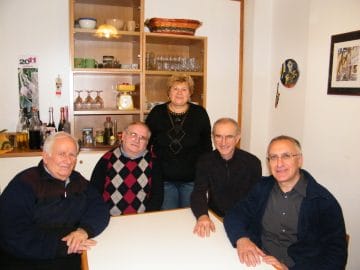
Feb 11, 2016 | Focolare Worldwide, Senza categoria
 “I was still a child,” Alfonso from the class of 1945 recounts, “when my father was unjustly imprisoned. My mother and I would visit him in prison and, at such a tender age I realised how lonely the inmates were: people without hope or future – and without dignity. So, I promised myself that one day I would do something for them.” Alfonso had to wait for that chance. He enrolled in a course on volunteering and obtained permission to make visits to Rebibbia Prison, which currently has 1,700 inmates. They are serving time for the most varied crimes: drug dealing, sex abuse, mafia activity, extortion, murder, and more. Alfonso was aware that his efforts would be limited by the distrust of the inmates who belived they had lost any chance at redemption. In fact, many of them refused to let him approach. But he never gave up because he was convinced they were the image of the God he had chosen when he became a focolarino. Finally, one inmate named Giorgio who was serving time for a kidnapping that ended in tragedy, asked Alfonso to go to his mother, to embrace her and ask her to forgive him. Alfonso went and found the woman close to the end of her life. This totally unexpected, but long-awaited gesture, reconciled her to her son and the past. A few days later, she died peacefully. Alfonso stood by her son until his release from prison. He also helped Giorgio find temporary employment that restored his sense of dignity, enabling him to contribute to the support of the family.
“I was still a child,” Alfonso from the class of 1945 recounts, “when my father was unjustly imprisoned. My mother and I would visit him in prison and, at such a tender age I realised how lonely the inmates were: people without hope or future – and without dignity. So, I promised myself that one day I would do something for them.” Alfonso had to wait for that chance. He enrolled in a course on volunteering and obtained permission to make visits to Rebibbia Prison, which currently has 1,700 inmates. They are serving time for the most varied crimes: drug dealing, sex abuse, mafia activity, extortion, murder, and more. Alfonso was aware that his efforts would be limited by the distrust of the inmates who belived they had lost any chance at redemption. In fact, many of them refused to let him approach. But he never gave up because he was convinced they were the image of the God he had chosen when he became a focolarino. Finally, one inmate named Giorgio who was serving time for a kidnapping that ended in tragedy, asked Alfonso to go to his mother, to embrace her and ask her to forgive him. Alfonso went and found the woman close to the end of her life. This totally unexpected, but long-awaited gesture, reconciled her to her son and the past. A few days later, she died peacefully. Alfonso stood by her son until his release from prison. He also helped Giorgio find temporary employment that restored his sense of dignity, enabling him to contribute to the support of the family.  Through his visits with inmates, Alfonso has come to realise the importance of that fragile thread that connects them to the outside world. This is why he works so hard at keeping the relationship with families alive – especially with wives – and supporting families that find themselves in dire straits because of their relative’s imprisonment. This all takes time, people, energy and money. Alfonso never gave up. He began a project called “Always A Person” to show that prison does not take away a person’s human dignity, especially because God’s love for each one of us never diminishes. With 30 other volunteers – parents, professionals and ex-inmates – he has followed up with the families of 160 inmates, offering moral, economic and food support. The numbers grow each day. The spirit of the group is that of a focolare: “being family” for each inmate, being close to him and supporting him – never judging anyone’s past. In prison, words like trust and brotherhood take on deep meaning – especially mercy, an attitude that the volunteers say “acts on the person like a spring that helps them to get up again every time they’re tempted to let themselves go.” That’s how it was for Roberto who, after 8 years of incarceration and not finding any work, became homeless. Thanks to the “Always A Person” project he was accepted into a small welcome centre where he can practice his profession as a cook. There is also Francesco who had been a truck driver, but after 4 years in prison was not able to find a job because people didn’t trust him. Now, he belongs to the team of volunteers that prepares and delivers the packages for prisoners’ families. There are more stories like this one that are recounted in the books: “Ero carcerato…” and “Carcere e dintorni” written by Alfonso Di Nicola, and published by Città Nuova.
Through his visits with inmates, Alfonso has come to realise the importance of that fragile thread that connects them to the outside world. This is why he works so hard at keeping the relationship with families alive – especially with wives – and supporting families that find themselves in dire straits because of their relative’s imprisonment. This all takes time, people, energy and money. Alfonso never gave up. He began a project called “Always A Person” to show that prison does not take away a person’s human dignity, especially because God’s love for each one of us never diminishes. With 30 other volunteers – parents, professionals and ex-inmates – he has followed up with the families of 160 inmates, offering moral, economic and food support. The numbers grow each day. The spirit of the group is that of a focolare: “being family” for each inmate, being close to him and supporting him – never judging anyone’s past. In prison, words like trust and brotherhood take on deep meaning – especially mercy, an attitude that the volunteers say “acts on the person like a spring that helps them to get up again every time they’re tempted to let themselves go.” That’s how it was for Roberto who, after 8 years of incarceration and not finding any work, became homeless. Thanks to the “Always A Person” project he was accepted into a small welcome centre where he can practice his profession as a cook. There is also Francesco who had been a truck driver, but after 4 years in prison was not able to find a job because people didn’t trust him. Now, he belongs to the team of volunteers that prepares and delivers the packages for prisoners’ families. There are more stories like this one that are recounted in the books: “Ero carcerato…” and “Carcere e dintorni” written by Alfonso Di Nicola, and published by Città Nuova.
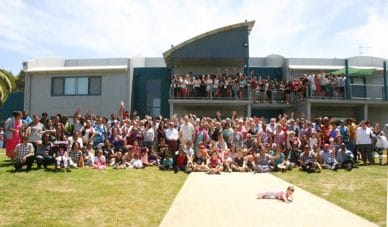
Feb 1, 2016 | Focolare Worldwide, Senza categoria
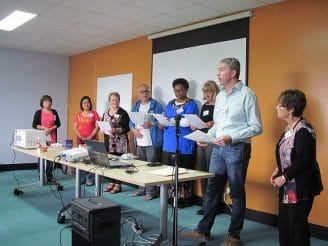 Five hundred and forty people from different countries – half of them families and young people – were together for four days. There were two refugees from Burundi and a group from Syria, 169 people from the Pacific Islands (New Caledonia, Wallis & Futuna, Fiji and Kiribati). The Mariapolis was held on January 13-17 on Phillip Island, 150 km from Melbourne (Australia). The title chosen for the event was “Building Unity Together”. The organisers write: “This central point of the spirituality of unity was examined in a formal presentation and immediately embraced and lived out each day of the Mariapolis by all the participants, some of them from very different cultural backgrounds.”
Five hundred and forty people from different countries – half of them families and young people – were together for four days. There were two refugees from Burundi and a group from Syria, 169 people from the Pacific Islands (New Caledonia, Wallis & Futuna, Fiji and Kiribati). The Mariapolis was held on January 13-17 on Phillip Island, 150 km from Melbourne (Australia). The title chosen for the event was “Building Unity Together”. The organisers write: “This central point of the spirituality of unity was examined in a formal presentation and immediately embraced and lived out each day of the Mariapolis by all the participants, some of them from very different cultural backgrounds.” 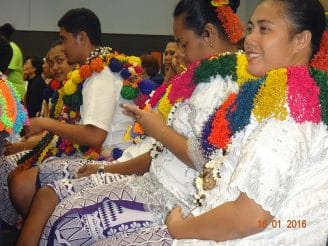 The people who came from the Pacific Islands made a great contribution beginning from their common witness of raising the money to be there: “like the representative from Kiribati who took leave of his work as a seaman in order to be able to attend. There were many beautiful testimonies of Gospel living and how they managed to overcome the many economic problems and raise the money to pay for the flight and lodging. A communion of goods was set in motion a bit like that of the early Christians, and it made everyone experience God’s personal love for them because of the Providence that arrived in many different ways. When they arrived at the Mariapolis they spoke of finding the same family that was no different from the one they had left behind.”
The people who came from the Pacific Islands made a great contribution beginning from their common witness of raising the money to be there: “like the representative from Kiribati who took leave of his work as a seaman in order to be able to attend. There were many beautiful testimonies of Gospel living and how they managed to overcome the many economic problems and raise the money to pay for the flight and lodging. A communion of goods was set in motion a bit like that of the early Christians, and it made everyone experience God’s personal love for them because of the Providence that arrived in many different ways. When they arrived at the Mariapolis they spoke of finding the same family that was no different from the one they had left behind.”  Every day ended in an atmosphere of celebration and gratitude for each ethnic group that was represented, like a small slice of a united world. Everyone felt that “The unity of peoples was not a utopia.” The people from the islands stayed on for an extra week at the Mariapolis Centre in Melbourne, where they attended a course on family life. “Each day is like a mutual love competition, and we look forward to the next activity with much joy and enthusiasm. There’s a saying, “From little things big things grow”, and we’re sure that great things will grow from Jesus in our midst through our mutual love.” See on Facebook: Phillip Island Mariapolis 2016
Every day ended in an atmosphere of celebration and gratitude for each ethnic group that was represented, like a small slice of a united world. Everyone felt that “The unity of peoples was not a utopia.” The people from the islands stayed on for an extra week at the Mariapolis Centre in Melbourne, where they attended a course on family life. “Each day is like a mutual love competition, and we look forward to the next activity with much joy and enthusiasm. There’s a saying, “From little things big things grow”, and we’re sure that great things will grow from Jesus in our midst through our mutual love.” See on Facebook: Phillip Island Mariapolis 2016

Jan 25, 2016 | Focolare Worldwide, Senza categoria
 “I teach in a Catholic school in my city, Salta, in northern Argentina,” says Gabriela Carral. “In early October of 2015, I met Misael, a 10 year old student, following a prayer service held by Orthodox and Catholics for peace in Syria. At that particular time, the image of the lifeless body of the little Syrian boy, Aylan, had made the headlines globally through the mass media. Misael told me he wanted to do something for peace in our school, adding that what hurt him most of all was knowing that so many children were orphaned by the war. We arranged to meet at recreation time. He explained that he was part of the Orthodox community, and that he was convinced that we should pray for peace: Catholics and Orthodox together. A few days later, he showed me a flyer that he had in his folder. The text read: “Syria is us. Let us for peace.” I was surprised to see that a child, in the midst of almost 800 pupils in elementary and secondary schools, could be so sensitive to the pain of people suffering thousands of kilometers away. I liked his idea and I encouraged him to share it with the school principal and staff. The outcome was a plan to organise an ecumenical prayer for peace. For the first time the word ecumenism resounded in the halls of this school, among the leaders, teachers and students.
“I teach in a Catholic school in my city, Salta, in northern Argentina,” says Gabriela Carral. “In early October of 2015, I met Misael, a 10 year old student, following a prayer service held by Orthodox and Catholics for peace in Syria. At that particular time, the image of the lifeless body of the little Syrian boy, Aylan, had made the headlines globally through the mass media. Misael told me he wanted to do something for peace in our school, adding that what hurt him most of all was knowing that so many children were orphaned by the war. We arranged to meet at recreation time. He explained that he was part of the Orthodox community, and that he was convinced that we should pray for peace: Catholics and Orthodox together. A few days later, he showed me a flyer that he had in his folder. The text read: “Syria is us. Let us for peace.” I was surprised to see that a child, in the midst of almost 800 pupils in elementary and secondary schools, could be so sensitive to the pain of people suffering thousands of kilometers away. I liked his idea and I encouraged him to share it with the school principal and staff. The outcome was a plan to organise an ecumenical prayer for peace. For the first time the word ecumenism resounded in the halls of this school, among the leaders, teachers and students.  In order to put this plan into action, I contacted a religious order priest who shares my goal in trying to live the prayer of Jesus: “That all may be one”. Fr Adolfo, from the Orthodox Church of Antioch, also got involved, and together we organized every detail of the celebration. Subsequently the Lutheran Church asked to join us since our school community includes a young Lutheran volunteer from Germany. Others then showed interest in the event, such as the president of the local Syrian-Lebanese community, the German consul and the vice-consul of Italy, a representative from the Ministry of Education, newspaper journalists and the heads of other schools. The first step of Misael’s project was that of trying to build peace in our everyday relationships, and this gave rise to many new experiences lived among the children to which we also proposed the Time Out prayer for peace promoted by Youth for a United World. Through the homilies given by the celebrants, we shared in the life of Christians in Syria and Africa; the intentions for peace were read out by a young Orthodox girl while a woman recited the Lord’s Prayer in Arabic. The flags of the different countries which were hoisted up warmed our hearts and made us feel like members of the one human family. In short, it was a celebration that enabled each of one us to experience something that we had not experienced so strongly beforehand: profound friendships and unimaginable bonds. The school principle and staff of the school called it a historic day. “We thank God for our freedom,” concluded the young people present, “and we promise not to ever take sides but to stand on the side of peace.” Gustavo Clariá
In order to put this plan into action, I contacted a religious order priest who shares my goal in trying to live the prayer of Jesus: “That all may be one”. Fr Adolfo, from the Orthodox Church of Antioch, also got involved, and together we organized every detail of the celebration. Subsequently the Lutheran Church asked to join us since our school community includes a young Lutheran volunteer from Germany. Others then showed interest in the event, such as the president of the local Syrian-Lebanese community, the German consul and the vice-consul of Italy, a representative from the Ministry of Education, newspaper journalists and the heads of other schools. The first step of Misael’s project was that of trying to build peace in our everyday relationships, and this gave rise to many new experiences lived among the children to which we also proposed the Time Out prayer for peace promoted by Youth for a United World. Through the homilies given by the celebrants, we shared in the life of Christians in Syria and Africa; the intentions for peace were read out by a young Orthodox girl while a woman recited the Lord’s Prayer in Arabic. The flags of the different countries which were hoisted up warmed our hearts and made us feel like members of the one human family. In short, it was a celebration that enabled each of one us to experience something that we had not experienced so strongly beforehand: profound friendships and unimaginable bonds. The school principle and staff of the school called it a historic day. “We thank God for our freedom,” concluded the young people present, “and we promise not to ever take sides but to stand on the side of peace.” Gustavo Clariá
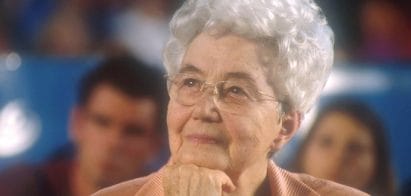
Jan 22, 2016 | Senza categoria
 “With brothers and sisters of the various Churches, by striving to live the Gospel together, getting to know one another and strengthening our reciprocal love, we discovered the great wealth of our common patrimony: Baptism, the Old and New Testaments, the dogmas of the first Councils which we share, the Creed (Nicene-Constantinopolitan), the Greek and Latin Fathers, the martyrs and other treasures, like the life of grace, faith, hope, charity, and the many other interior gifts of the Holy Spirit. And besides all this, we are united by the spirituality of unity. At first we lived as if all this were not really true or we were not fully aware of it. Instead now we realize that these are the conditions for being able to achieve a particular dialogue: the dialogue of life. This spirituality makes us feel that we are already one family; we feel that we form among ourselves “a Christian people” which involves not only laity but also to priests, pastors, bishops, and so on. Obviously, the full and visible communion among our Churches still needs to be achieved, but we can already be so. It is not a grassroots dialogue that opposes or juxtaposes the high level dialogue or that of the Church leaders, but it is a dialogue in which all Christians can participate. This people is like a leaven in the ecumenical Movement which rekindles in everyone the sense that, as baptized Christians who can love one another, we can all contribute towards fulfilling the Testament of Jesus. Indeed, we hope that other forms of dialogue, like the dialogue of charity, of shared service, of prayer and the theological dialogue, can be enhanced by the “dialogue of life”.” Extract from the book: Chiara Lubich: “Unity”, New City Press, New York (USA)
“With brothers and sisters of the various Churches, by striving to live the Gospel together, getting to know one another and strengthening our reciprocal love, we discovered the great wealth of our common patrimony: Baptism, the Old and New Testaments, the dogmas of the first Councils which we share, the Creed (Nicene-Constantinopolitan), the Greek and Latin Fathers, the martyrs and other treasures, like the life of grace, faith, hope, charity, and the many other interior gifts of the Holy Spirit. And besides all this, we are united by the spirituality of unity. At first we lived as if all this were not really true or we were not fully aware of it. Instead now we realize that these are the conditions for being able to achieve a particular dialogue: the dialogue of life. This spirituality makes us feel that we are already one family; we feel that we form among ourselves “a Christian people” which involves not only laity but also to priests, pastors, bishops, and so on. Obviously, the full and visible communion among our Churches still needs to be achieved, but we can already be so. It is not a grassroots dialogue that opposes or juxtaposes the high level dialogue or that of the Church leaders, but it is a dialogue in which all Christians can participate. This people is like a leaven in the ecumenical Movement which rekindles in everyone the sense that, as baptized Christians who can love one another, we can all contribute towards fulfilling the Testament of Jesus. Indeed, we hope that other forms of dialogue, like the dialogue of charity, of shared service, of prayer and the theological dialogue, can be enhanced by the “dialogue of life”.” Extract from the book: Chiara Lubich: “Unity”, New City Press, New York (USA)

 “I started to give a hand, Annette, a German Focolarina recounts, “in December 2014. The cold had already set in and there was urgent need for blankets. In trying to find out more, a member of the RomAmoR ONLUS proposed: “More than blankets we need you to come and give us a hand.” The week after I was already at the Ostia station. It was a really moving experience. On approaching those people I discovered that oddly enough, they were the ones to welcome me! I realised that this is not an uncomfortable category of people to avoid, but persons who wish to relate with others, and are capable of imbuing human warmth. After a while also the volunteers came with a hot dinner and the anonymous, cold and bleak station, warmed up. ” Annette has changed since then. The first nights she couldn’t sleep thinking of Giovanni, Stefan, Mohamed who did not have a warm bed like hers. She started to review her wardrobe, to see if there was still something else she could share, despite the fact that in the Focolare community already tries to live only with the essentials. But above all, she continued going to the station every Monday. One evening, looking at the notebook that listed the requests of the homeless, she saw that a man needed a pair of shoes. Since there were none in the house she remembered Chiara Lubich’s experience during the war, when she asked Jesus present in the poor, for a pair of shoes. “So I did the same thing and in two weeks ten pairs of shoes arrived!”
“I started to give a hand, Annette, a German Focolarina recounts, “in December 2014. The cold had already set in and there was urgent need for blankets. In trying to find out more, a member of the RomAmoR ONLUS proposed: “More than blankets we need you to come and give us a hand.” The week after I was already at the Ostia station. It was a really moving experience. On approaching those people I discovered that oddly enough, they were the ones to welcome me! I realised that this is not an uncomfortable category of people to avoid, but persons who wish to relate with others, and are capable of imbuing human warmth. After a while also the volunteers came with a hot dinner and the anonymous, cold and bleak station, warmed up. ” Annette has changed since then. The first nights she couldn’t sleep thinking of Giovanni, Stefan, Mohamed who did not have a warm bed like hers. She started to review her wardrobe, to see if there was still something else she could share, despite the fact that in the Focolare community already tries to live only with the essentials. But above all, she continued going to the station every Monday. One evening, looking at the notebook that listed the requests of the homeless, she saw that a man needed a pair of shoes. Since there were none in the house she remembered Chiara Lubich’s experience during the war, when she asked Jesus present in the poor, for a pair of shoes. “So I did the same thing and in two weeks ten pairs of shoes arrived!” 

 “I was still a child,” Alfonso from the class of 1945 recounts, “when my father was unjustly imprisoned. My mother and I would visit him in prison and, at such a tender age I realised how lonely the inmates were: people without hope or future – and without dignity. So, I promised myself that one day I would do something for them.” Alfonso had to wait for that chance. He enrolled in a course on volunteering and obtained permission to make visits to Rebibbia Prison, which currently has 1,700 inmates. They are serving time for the most varied crimes: drug dealing, sex abuse, mafia activity, extortion, murder, and more. Alfonso was aware that his efforts would be limited by the distrust of the inmates who belived they had lost any chance at redemption. In fact, many of them refused to let him approach. But he never gave up because he was convinced they were the image of the God he had chosen when he became a
“I was still a child,” Alfonso from the class of 1945 recounts, “when my father was unjustly imprisoned. My mother and I would visit him in prison and, at such a tender age I realised how lonely the inmates were: people without hope or future – and without dignity. So, I promised myself that one day I would do something for them.” Alfonso had to wait for that chance. He enrolled in a course on volunteering and obtained permission to make visits to Rebibbia Prison, which currently has 1,700 inmates. They are serving time for the most varied crimes: drug dealing, sex abuse, mafia activity, extortion, murder, and more. Alfonso was aware that his efforts would be limited by the distrust of the inmates who belived they had lost any chance at redemption. In fact, many of them refused to let him approach. But he never gave up because he was convinced they were the image of the God he had chosen when he became a 



 “I teach in a Catholic school in my city, Salta, in northern
“I teach in a Catholic school in my city, Salta, in northern 